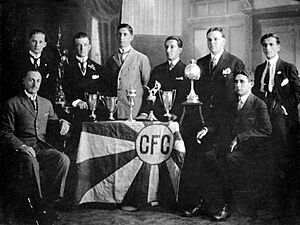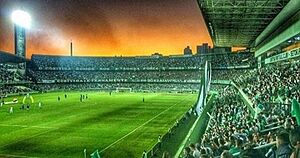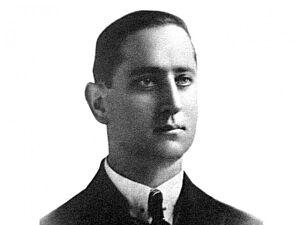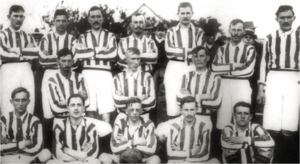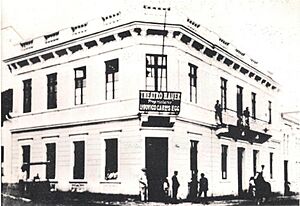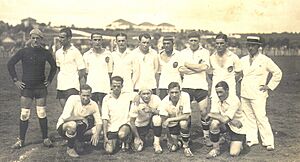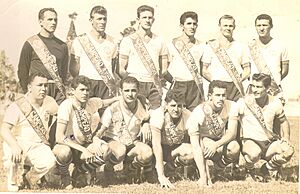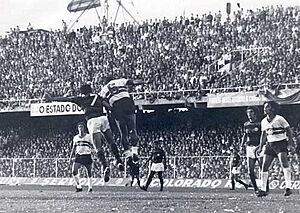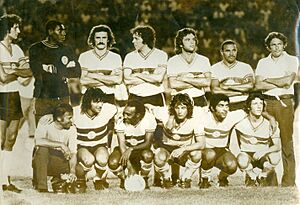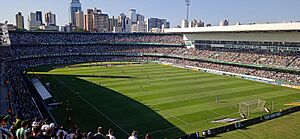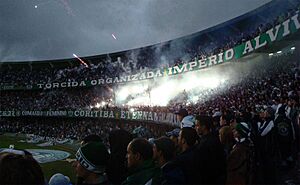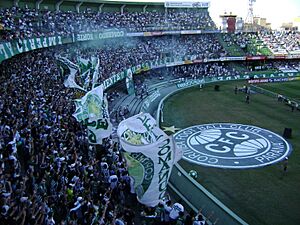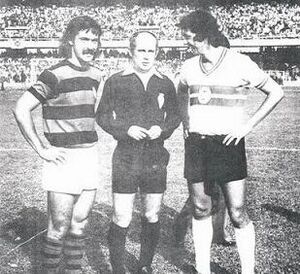Coritiba Foot Ball Club facts for kids
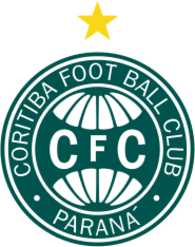 |
||||
| Full name | Coritiba Foot Ball Club | |||
|---|---|---|---|---|
| Nickname(s) | Coxa (Thigh) Glorioso (Glorious) |
|||
| Founded | October 12, 1909 | |||
| Ground | Couto Pereira | |||
| Capacity | 40,502 | |||
| SAF Owner | Treecorp (90%) Coritiba Foot Ball Club (10%) |
|||
| President | Glenn Stenger | |||
| Head coach | Mozart | |||
| League | Campeonato Brasileiro Série A Campeonato Paranaense |
|||
| 2022 2022 |
Série A, 15th of 20 Paranaense, 1st of 12 (champions) |
|||
|
||||
Coritiba Foot Ball Club, often called Coritiba or Coxa, is a Brazilian football team. It is from Curitiba, the capital city of Paraná state. The club was started in 1909 by German immigrants. It is the oldest football club in the state and has won the most titles there.
Coritiba plays its home games at Estádio Couto Pereira, which was built in 1932. The stadium can hold over 40,000 fans. Coritiba has a big rivalry with Athletico Paranaense, and their matches are called the Atletiba derby. They also play against Paraná Clube in the Paratiba derby.
Coritiba was the first club from Paraná to win the top Brazilian Championship (Série A) in 1985. This win ended a long streak of teams from other big states winning the title. The club has also won the second division (Série B) twice, in 2007 and 2010. Coritiba has won the Paraná State Championship 39 times, which is more than its main rivals combined.
In June 2023, a company called Treecorp Investimentos bought 90% of the club. This deal was worth 1.1 billion Brazilian reais.
Contents
Club Achievements
Coritiba was the first club from southern Brazil to win a national title, the 1973 Torneio do Povo. It was also the first southern club to play in major South American competitions like the Copa Libertadores and the Copa Sudamericana.
The club was the first from Paraná to win the top Brazilian league, Série A. It also reached the semi-finals of the Copa do Brasil (Brazil's main cup competition) several times, and made it to the finals in 2011 and 2012.
Coritiba holds the record for winning the Paraná State Championship six times in a row, from 1971 to 1976. It has also played in this championship more than any other club. Coritiba has over 30,000 members and is highly ranked in various football associations.
The club has partnerships with teams like FC Porto and S.L. Benfica from Portugal, and C.D. Guadalajara from Mexico. Coritiba also holds a world record for the most consecutive wins in official football games, with 24 victories in a row. The club has played over 4,800 games in its history.
Coritiba was also the first football club in southern Brazil to start an American football team. The Coritiba Crocodiles have won the Brazilian championship three times.
Club History
How Coritiba Started
In 1909, a group of young men met at a German-Brazilian gymnastics club in Curitiba. One member, Fritz Essenfelder, brought a leather football and taught his friends the rules of this new game. They started playing matches at a local military headquarters.
Later, they were invited to play against a team of railway workers from Ponta Grossa. On October 12, 1909, Fritz called a meeting to plan this first match. They decided to form a football club, which they first called Teuto-Brasileiro. This was the very first football club in Paraná state.
The First Game
Coritiba played its first official game on October 23, 1909, in Ponta Grossa. They played against Clube de Foot Ball de Tiro Pontagrossense. Coritiba lost 1-0.
The players for Coritiba's first match included Fritz Essenfelder, Arthur Iwersen, and others.
Forming the Club
After their first game, the founders were very excited about football. They decided to make their club only about football. Since the gymnastics club didn't allow non-German members, they formed a new, separate club. On January 30, 1910, the Coritibano Foot Ball Club was officially created.
On April 21, 1910, the first club meeting was held. They chose João Viana Seiler as their first president. During this meeting, the club's name was changed to Coritiba to avoid confusion with another social club. This moment marked the official start of organized football in Paraná state.
Early Years (1910s and 1920s)
Coritiba needed a football field. They chose the Hipódromo do Guabirotuba (Horse Racing Track), which they renamed Prado de Guabirotuba. The first game there was on June 12, 1910, against Ponta Grossa Foot Ball Club. Coritiba won 5-3. This was the first football match played in Curitiba, with 200 people watching. Coritiba played at this stadium until 1917.
In 1915, Coritiba started playing in the City Championship and the State Championship. They won both in 1916. A star player named José Bermudes, known as Maxambomba, became the first player from Paraná to be chosen for the Brazil national team. In 1917, Coritiba moved to a new stadium, Parque da Graciosa.
In the 1920s, Coritiba continued to win local tournaments. In 1921, they beat the São Paulo state team 1-0, which was a big deal because that team had many national players. This win put Paraná football on the national map. Maxambomba and Gonçalo Pena were chosen for the Brazil national team that played in the 1921 South American Championship.
The big rivalry between Coritiba and Clube Atlético Paranaense began in 1924. Coritiba beat Atlético 6-3. In 1926, Coritiba had its biggest win in the Paraná state championship, beating Paraná Sports 13-1. In 1927, Coritiba won the State Championship easily.
Growth and New Stadium (1930s and 1940s)
In 1930, Coritiba won another Torneio Início. In 1931, they won the State Championship. A player-manager named Moaçir Gonçalves became the first black player for a team from the state capital. Another important player was Rei, a young goalkeeper who became known as 'The King' and was the first goalkeeper from Paraná to play for the national team.
On November 19, 1932, Coritiba opened its new stadium, Belfort Duarte. They won the first game there 4-2 against América-RJ. This started a successful period for the club, as they won many titles in the 1930s.
In the 1940s, Coritiba played its first international match against an Argentine team in 1941. In 1942, they played their first night game under floodlights in Paraná state. In 1947, Coritiba won all four categories of the State Championship (youth, amateur, and professional), earning the nickname 'Super Champion'. In 1949, they beat Rapid Vienna of Austria 4-0.
Success Continues (1950s and 1960s)
The 1950s were very good for Coritiba. They won the State Championship six times during this decade. In 1960, they won the State Championship again.
In 1967, Evangelino da Costa Neves became the new president and led the club for over twenty years. Coritiba also played friendly matches against famous international teams like Atlético Madrid from Spain and the Hungary national team.
In 1968, Coritiba won the State Championship after an eight-year break. In 1969, the club went on its first international tour, playing friendly games in Europe against teams like Valencia CF and Borussia Dortmund. They even won the Pierre Colon Cup in France.
The Golden Decade (1970s)
The 1970s are known as The Golden Decade for Coritiba. They won six State Championships in a row from 1971 to 1976, a record in Paraná football. In 1971, Coritiba beat the France national team 2-1.
In 1972, Coritiba went on another international tour to Algeria and Morocco, returning undefeated. This earned them the Fita Azul award. In 1973, Coritiba won the Torneio do Povo, becoming the first team from southern Brazil to win a national title. In 1977, the Belfort Duarte stadium was renamed Major Antônio Couto Pereira. Coritiba ended the 1970s with eight state championships.
National Champions (1980s)
The 1980s brought Coritiba its greatest glory. In 1985, Coritiba won the Brazilian Championship (Série A). This was a huge achievement, as they were the first team from outside the traditional big states to win it.
In the final, Coritiba played against Bangu. The game ended 1-1, and Coritiba won in a penalty shootout at the famous Maracanã Stadium. This victory was special because Coritiba won the title with a negative goal difference, meaning they scored fewer goals than they let in over the whole season.
In 1986, Coritiba played in the Copa Libertadores for the first time, being the first team from Paraná to do so. They also won the State Championship that year. In 1989, Coritiba won the State Championship again.
Ups and Downs (1990s)
The 1990s were a bit challenging for Coritiba. They faced financial problems and moved between the first and second divisions of the Brazilian Championship. However, they made it to the semi-finals of the Copa do Brasil in 1991.
In 1995, Coritiba returned to Série A. In 1997, they won the Festival Brasileiro de Futebol, which was a much-needed title for the club. In 1999, Coritiba won the Campeonato Paranaense again, ending a nine-year wait for the state title.
New Century Challenges (2000s)
In the early 2000s, Coritiba had some good results, reaching the Copa do Brasil semi-finals in 2001. In 2003, they won the Campeonato Paranaense without losing a single game and finished fifth in the Brasileirão, which allowed them to play in the Copa Libertadores in 2004. They won the State Championship again in 2004.
In 2005, Coritiba was relegated to Série B. However, they had the fourth-highest average attendance in the league that year, showing strong fan support. In 2007, Coritiba won the Série B title and returned to Série A. Key young players like Henrique and Keirrison helped the team.
In 2009, Coritiba was relegated to Série B again after a tie with Fluminense. This led to some fan unrest at the stadium.
Recent History (2010s and 2020s)
In 2010, Coritiba won the Campeonato Paranaense. They also won the Série B title again, returning to Série A. In 2011, Coritiba won the Campeonato Paranaense again, remaining undefeated. They also set a new Brazilian record for consecutive wins, with 24 victories in a row.
Coritiba reached the final of the Copa do Brasil in both 2011 and 2012 but lost both times. In 2012, they won the Campeonato Paranaense for the third time in a row. The following years saw the club move between divisions, being relegated in 2017 and 2020.
In May 2023, Coritiba sold 90% of its shares to Treecorp, a private equity company. This was a big step for the club's future.
Club Information
Club Name
The city of Curitiba got its current official name in 1919, ten years after the club was founded as Coritiba. In the early days of football in Brazil, many English words were used, like "match" and "players." So, "Foot Ball Club" was a common and correct name at the time, and it has stayed that way.
Team Colors and Logo
Coritiba's colors are green and white, which are the same colors as the Paraná state flag. Coritiba is the oldest "green and white" team in Brazilian football.
The club's logo is a green circle with the letters "CFC" (for Coritiba Foot Ball Club) in white. It also has twelve white pine seeds, which represent the local Paraná pine trees. The first logo was simpler, just a white background inside a green circle with green "CFC" letters.
Team Uniforms
Coritiba's first uniform, used from 1909 to 1916, had green and white vertical stripes. From 1916 to 1976, they wore an all-white uniform.
Today, the home uniform is a white shirt with two green horizontal stripes, black shorts, and white socks. The away uniform has green and white vertical stripes, black shorts, and green socks. These designs were adopted in 1976.
|
Home (2024)
|
Away (2024)
|
Third (2024)
|
|
1985 Home Kit (National Champion)
|
1993 Home Kit
|
2005/06 Home
|
Club Mascot
Coritiba's mascot is an old man called Vovô Coxa (Grandpa Coxa). He represents the club's long history as the oldest football club in Curitiba.
Club Anthem
The official club anthem was written by Cláudio Ribeiro and composed by Homero Rébuli. There are also other unofficial songs that fans sing.
Club Stadium
Estádio Couto Pereira is Coritiba's home stadium. It is also known as Alto da Glória.
- Name: Estádio Major Antônio Couto Pereira
- Capacity: 40,502 people
- Opened: 1932
The land for the stadium was given or sold cheaply by Nicolau Scheffer. At the time, it was far from the city center. In 2005, the stadium was renovated. The field was made bigger, and fences were removed to give fans a better view. The changing rooms and other facilities were also updated.
The stadium was first called Estádio Belfort Duarte. In 1977, its name was changed to honor Major Antônio Couto Pereira, who was very important in making the stadium a reality.
Training Ground
In 1988, Coritiba started planning a training center. Land was bought near the old Estrada da Graciosa road. The training ground, named Bayard Osna Training Center, was officially opened on December 20, 1997.
Today, this training center is considered one of the best in the country. It has five official football fields with different types of grass. It also has three changing rooms, a heated swimming pool, a parking lot, and a press area. For player health, there's a modern physiology clinic, a full gym, and rooms for physiotherapy, psychology, and nutrition. This center helps young players develop and become future stars for Coritiba.
Club Supporters
Coritiba's main organized fan group is Império Alviverde, started in 1977. This group wears green and white and is one of the biggest fan groups in southern Brazil.
Coritiba fans are known for their strong support. In 1939, a former Coritiba goalkeeper named Pinha created the first organized fan group in Paraná, with drumming and chants.
In 2010, even when the team had to play games far from Curitiba due to a punishment, over 33,000 fans traveled to support them. This shows how passionate Coritiba fans are. Coritiba's fan base is one of the largest in southern Brazil and often has the highest average attendance in the state championship.
Coritiba fans are also famous for creating the Green Hell at Couto Pereira. They use pyrotechnics, smoke, paper, and lights to make an amazing atmosphere during games. Another large fan group is Dragões Alviverde, founded in 1996.
Club Rivalries
Coritiba has two main rivals from its home city: Atlético-PR and Paraná Clube.
Atletiba Derby
The Atletiba classic is the name for games between Coritiba and Atlético Paranaense. These matches have been played since June 8, 1924, when Coritiba won 6-3. Over the years, this has become one of the biggest rivalries in southern Brazil. The biggest win in this derby was Coritiba's 6-0 victory in 1959.
Paratiba Derby
The Paratiba is the classic match between Coritiba and Paraná Clube. Their first game was on February 4, 1990, which Coritiba won 1-0. The biggest wins in this rivalry include Paraná's 6-1 victory in 2002 and Coritiba's 5-0 victory in 2021.
Club Honours
Official Titles
| National | ||
|---|---|---|
| Competitions | Titles | Seasons |
| Campeonato Brasileiro Série A | 1 | 1985 |
| Campeonato Brasileiro Série B | 2s | 2007, 2010 |
| State | ||
| Competitions | Titles | Seasons |
| Campeonato Paranaense | 39 | 1916, 1927, 1931, 1933, 1935, 1939, 1941, 1942, 1946, 1947, 1951, 1952, 1954, 1956, 1957, 1959, 1960, 1968, 1969, 1971, 1972, 1973, 1974, 1975, 1976, 1978, 1979, 1986, 1989, 1999, 2003, 2004, 2008, 2010, 2011, 2012, 2013, 2017, 2022 |
- record
- s shared record
Other Tournaments
- International:
- Torneio Internacional de Verão de Curitiba (3): 1968, 1970, 1971
- Pierre Colon Cup (1): 1969
- Algeria-Morocco Tournament (1): 1972
- Akwaba Cup (1): 1983
- National:
- Torneio do Povo (1): 1973
- Festival Brasileiro de Futebol (1): 1997
- Inter-state:
- Torneio Quadrangular de Goiânia (1): 1975
- Torneio Maurício Fruet (1): 1985
- State:
- Torneio Início do Paraná (11): 1917, 1920, 1921, 1930, 1932, 1939, 1941, 1942, 1951, 1952, 1957
- City:
- Taça Cidade de Curitiba (3): 1945, 1976, 1978
Runners-up
- Copa do Brasil (2): 2011, 2012
- Campeonato Brasileiro Série B (1): 1995
- Copa Sul-Minas (1): 2001
- Campeonato Paranaense (23): 1918, 1919, 1920, 1936, 1943, 1944, 1945, 1950, 1962, 1970, 1977, 1983, 1984, 1990, 1995, 1996, 1998, 2000, 2005, 2015, 2016, 2018, 2020
Youth Team Titles
- Copa do Brasil Sub-20 (1): 2021
- Taça Belo Horizonte de Juniores (1): 2010
- Copa Votorantim Sub-15 (1): 2012
Awards
- Fita Azul (1): 1972
The Fita Azul (Blue Ribbon) award was given to clubs that had successful international tours.
Other Sports
Coritiba is not just about football! The club also has teams in other sports.
American Football
The Coritiba Crocodiles American football team has won the Brazilian championship three times (2013, 2014, 2022) and the Paraná state championship ten times.
Basketball
Coritiba's basketball team has won the Campeonato Paranaense twice (1944, 1945) and the Campeonato Metropolitano nine times.
E-sports
Coritiba also has an e-sports team that competes in video games. They won the Dota Pro Circuit - Tour 3: Division II in 2021-22 and Apex Legends Split 2 - Challenger Circuit #2 in 2023.
Seven-a-side Football
The seven-a-side football team has won the Liga das Américas twice (2018, 2019) and the Taça Governador do Paraná three times.
Club Records
Most Games Played
| # | Player | Years | Matches |
|---|---|---|---|
| 1 | 1972-1976, 1982-1987 | 410 | |
| 2 | 1973-1977, 1979-1980, 1983-1985 | 402 | |
| 3 | 1968-1976 | 386 |
Most Goals Scored
| # | Player | Years | Goals |
|---|---|---|---|
| 1 | 1954-1963 | 254 | |
| 2 | 1941-1947, 1951-1953 | 134 | |
| 3 | 1951-1961 | 129 |
Other Records
- First goal scorer: Fritz Essenfelter
- Most appearances: 440 appearances by Jairo (1971–77), (1984–87).
- Record goal scorer: 202 goals by Duílio Dias (1954–64).
- Consecutive victories: Coritiba holds the Guinness Book worldwide record for most consecutive victories (24), achieved between February and May 2011.
See also
 In Spanish: Coritiba Foot Ball Club para niños
In Spanish: Coritiba Foot Ball Club para niños
- Coritiba Foot Ball Club (youth)
 | Toni Morrison |
 | Barack Obama |
 | Martin Luther King Jr. |
 | Ralph Bunche |


